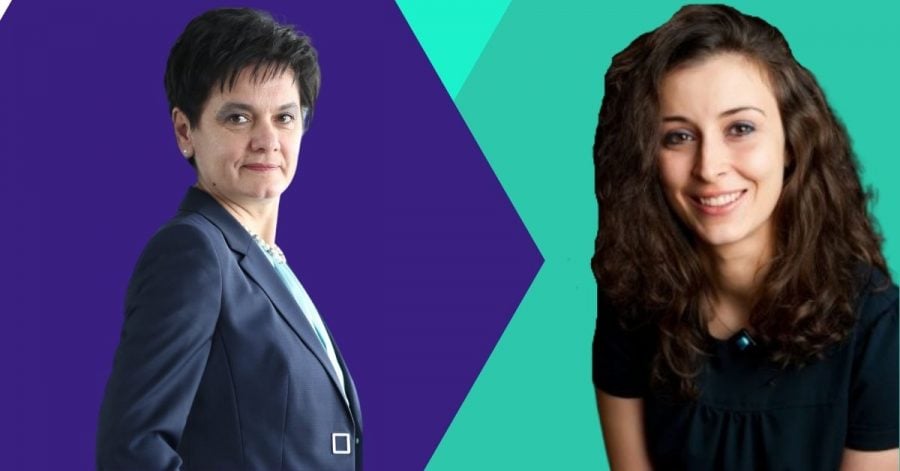This is a story about legacy. Boriana Manolova is a Bulgarian engineer with over 20 years of management experience, working for a global technology powerhouse. Ioana Hasan is a Romanian computer science engineer who co-founded a tech company when she was just 20 years old. Both of them inherited the passion to pursue a career in the tech sector from their mothers. One was an engineer, the other a developer.
Their stories exemplify why Bulgaria and Romania outperform other European countries when it comes to the representation of women in tech, typically male-dominated, professional sectors and also when it comes to women, leading in businesses in other domains. Romania and Bulgaria shine in the Female ICT specialists, with 23% and 28% respectively, when the EU average is a little over 17%. The average number of women scientists and engineers in the EU in 2018 was 41%, Bulgaria had 52% and Romania 41%. Bulgaria ranks third after Latvia and Estonia with the largest share of women in managerial positions in the EU, according to Eurostat.
The Recursive took a more detailed look behind the statistics and explored how this is empowering women in SEE to pursue a career in tech.
One possible explanation lies in Bulgaria and Romania’s socialist past. In the 1960s, Bulgaria began to develop its electronics and software industry and export technology to the former socialist bloc. Boriana Manolova, CEO of Siemens for Bulgaria and Northern Macedonia, explained that during this period, both boys and girls were equally encouraged to pursue a degree in Science, Technology, Engineering, and Mathematics (STEM), as the state placed women’s workplace emancipation at the heart of its ideology.
Access to tech education for women in SEE
This resulted in women having better access to tech education, as the Chili Piper’s Romanian founder, Alina Vandenberghe, shared with us in a previous interview: “I had exceptional technical training because I went to an excellent high school in Romania that promotes programming. Then I went to a good university that also had high-quality training for technical skills.”
This is also true for Bulgaria. Boriana Manolova shared that she has seen many women graduating in STEM over the years and that “most of them remained and realized themselves professionally in Bulgaria, serving as role models for future generations of girls”.
Manolova, whose mother was an engineer, explained that although the system has some shortcomings, “it is inclusive and encourages the study of subjects such as mathematics, information technology, and engineering as prestigious and desirable.”
Ioana Hasan, co-founder and product manager of Romanian SmartBill, an online accounting business application, who also studied Computer Science in her hometown, says that what is also important going forward is how you can upgrade what you’ve learned in school. “Learning never stops and I find that the people that are best in their fields don’t settle for ‘what they teach you in school’ and they learn a lot by themselves to take their craft to the next level,” she adds.
Women work in male-dominated teams
A study shows that in this region, 52% of women work in majority male teams. Since 2018 there has been a 10% increase in the number of women interested in tech or IT roles in Europe.
Hasan explains that there have been times when more men applied to the SmartBill jobs, but that now the team is more diverse. She continues that although she knows the ecosystem is dominated by men, she hasn’t felt it this way in Romania. Her work is “behind the scene” and her two male co-founders are the ones doing all the networking, as she explains they are better at it than her.
Lavinia Cojocaru, Lead Software Developer at UiPath shared that men in Romania tend to advance more in their careers. She believes this doesn’t mean women lack opportunities, but encouragement to follow certain career paths. She adds that although people value knowledge, expertise, and technical skills without discrimination, other biases are present. “Personally, I tried to challenge people to look beyond the way an idea is expressed and to see the substance in it, to promote individuals that are skillful but less outspoken and extroverted, and to encourage vulnerability as a way of building trust,” Cojocaru concluded.
Women empowering women movement
A global study shows that a little over 50% of women believe gender equality has improved and that 70% were appreciated for their ahead-of-gender skills in IT. The gender gap has narrowed, from 7% to 2% in the past decade, yet this is just the beginning of the equality journey.
The European Commission believes that the involvement of women in the tech sector will boost the economy with €16B. The study shows this sector is encouraged to challenge digital gender stereotypes, promote digital skills, education, and advocate for women entrepreneurs.
In Bulgaria, Boriana Manolova is the president of the Council of Women in Business, an organization that unites female top managers from various sectors to promote the professional and personal development of women in the country. “Today, with the recent boom of the IT industry in Bulgaria, women play a key role in it as experts, managers, leaders, mentors. Many of the largest technology companies in the country are run by incredibly successful and inspiring women. This creates preconditions for building a community of women in high positions in engineering and software sectors, who take the baton from their female predecessors and continue to encourage, promote, educate and support each other and others”, Manolova adds.
A similar initiative in Romania is the National Confederation of Female Entrepreneurs.
Ioana Hasan shared that she wasn’t aware she needed a female role model in this area until recently. Her mother was a programmer and her first source of inspiration, but she noticed many remarkable women lack proper visibility. The Bulgarian Centre of Women in Technology shared with The Recursive the importance of more networking and mentoring initiatives, and even workshops, seminars, and a fund dedicated to women entrepreneurs.







